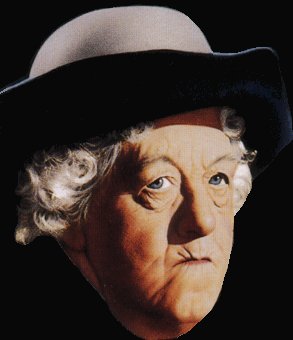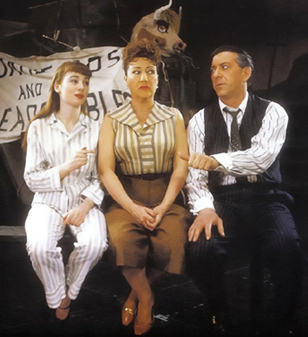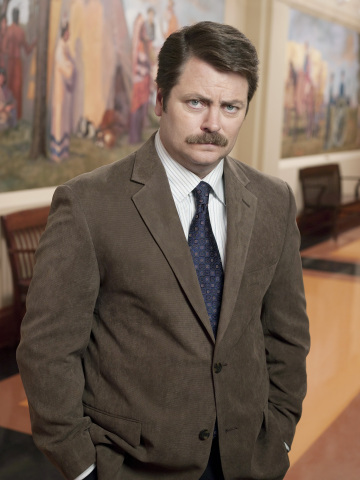I just read Nicholas Meyer's Hollywood memoir
The View From The Bridge. As the title implies, the emphasis is on
Star Trek, especially his first mission,
Star Trek II: The Wrath Of Khan (which he wanted to call
The Undiscovered Country). At first it seemed weird, since this is a guy who came to fame as a bestselling author and went on to write and/or direct a fair number of films and TV shows, only three of which have S
tar Trek in the title.
But the more you think of it, the more sense it makes. It makes commercial sense, of course, since books about
Trek sell. More than that, however, it seems likely that Meyer's contribution to
Star Trek is what he'll be remembered for. When the story of
Trek is written, Meyer isn't that far behind the show's creator, Gene Roddenberry, in importance.
Which is sort of funny, since
Star Trek played almost no part in his life until he worked on it. He'd heard of the show, but didn't watch. And when he was shown some episodes, didn't think much of it. Maybe that's why he was so helpful. He approached the movie fresh. Sure, he had to use the characters, and certain devices, but he wanted to make the story that stood on its own. (He was inspired by Captain Horatio Hornblower, and later discovered so was Roddenberry.)
Before Meyer came aboard to help write and direct
Star Trek II, the show had been on quite a ride. Its three-year TV voyage in the 60s wasn't that successful, but the fans refused to let it die, and it became hugely popular in syndication, spawning a whole
Star Trek industry. After the success of
Star Wars, Paramount figured they should try a
Trek movie. They threw money at the project and created a horrible film in 1979 that made a profit anyway. At this point, however, Paramount figured they needed to make a good sequel or the franchise might die. Roddenberry, central in creating the first film, would remain connected in name only, and producer Harve Bennett would oversee the new production.
He had five different screenplays written and none of them were any good. That's when he brought in Meyer, who was able to stitch together the good moments, add his own stuff, and deliver a script in a couple weeks--necessary to get the special effects done in time for the release date.
The budget for the film was slashed to one-fourth the original. Meyer describes in great detail the shoot, including dealing with Shatner, Nimoy and Ricardo Montalban, all who presented different problems. Anyway, the film came out (hardly guaranteed), got great reviews and made plenty of money. And Paramount has been making billions on new
Trek movies and TV shows since.
The Wrath Of Khan is probably considered the best in the series. I prefer
The Voyage Home, but there's no denying
Wrath revitalized the franchise and is filled with solid performances and iconic moments.
Meyer later helped write
Star Trek IV: The Voyage Home, which included ideas he hadn't been able to fit into his directorial debut,
Time After Time (another time travel movie set in present-day San Francisco). He also kept the basic Nimoy/Bennett concept of a cautionary ecological tale (which is actually the silliest part of a movie that's already close to a spoof).
IV turned out to be the biggest
Trek hit yet, but the fifth film,
The Final Frontier, which many figured would be the last with the orignal cast, was a disaster. The critics hated it and the audience stayed away. So Bennett and Nimoy (who had directed
III and
IV and was now producing) wanted one more shot, and brought back Meyer to helm
The Undiscovered Country. While not as great as
II or
IV, it's still pretty good, made money, and allowed them to go out with their heads held high.
Meyer, as you might expect, knows how to keep the narrative moving. He tells a lot of stories about his various struggles, sometimes ending in success, just as often in failure. Nevertheless, he manages to be entertaining no matter how much his heart was broken.
PS He has a short chapter on an enjoyable but not particularly successful comedy he did with Tom Hanks and John Candy,
Volunteers. (Hanks met his wife Rita Wilson on the shoot, just as Malcolm McDowell met his wife Mary Steenburgen on
Time After Time. In both cases, Meyer was taking a chance casting an unknown woman--maybe he could have had a career as a matchmaker.) It has a script by TV veterans Ken Levine and David Isaacs. It's interesting to read about it from Meyer's pont of view, since whenever Levine brings up the film on
his blog, he complains (properly, in my view) that Meyer hurt the film by adding a gag that broke the fourth wall.
PPS Unfortunately, like so many other books by entertainment figures, Meyer is happy to share his political views. Here's a man who has great stories to tell about art and entertainment--even his speculation in these areas is of interest--but he's not a man who has any particular insight into the great issues of our day. To be fair, he only spends a little time on his politics, but still, if someone dropped into one of his films a minute on something unrelated to the plot that stopped the action dead, he'd cut it.



































I remember when Roger first released this song, although he was born in Kenya, I am sure he is singing about Australia being beautiful. Never the less what a song for English Patriots!!!!!
Roger is a white Kenyan. I'm a white Tanzanian. This song is so, so sad. Just like he felt sailing away from Kenya, I broke my heart to leave my bush-home, and sail away from Tanzania. I've never forgotten the wonderful watu, the amazing animals, the Swahili language. I'm not a musician, I didn't sing about my experience. I tried to recapture it in writing. And Roger's song inspired me